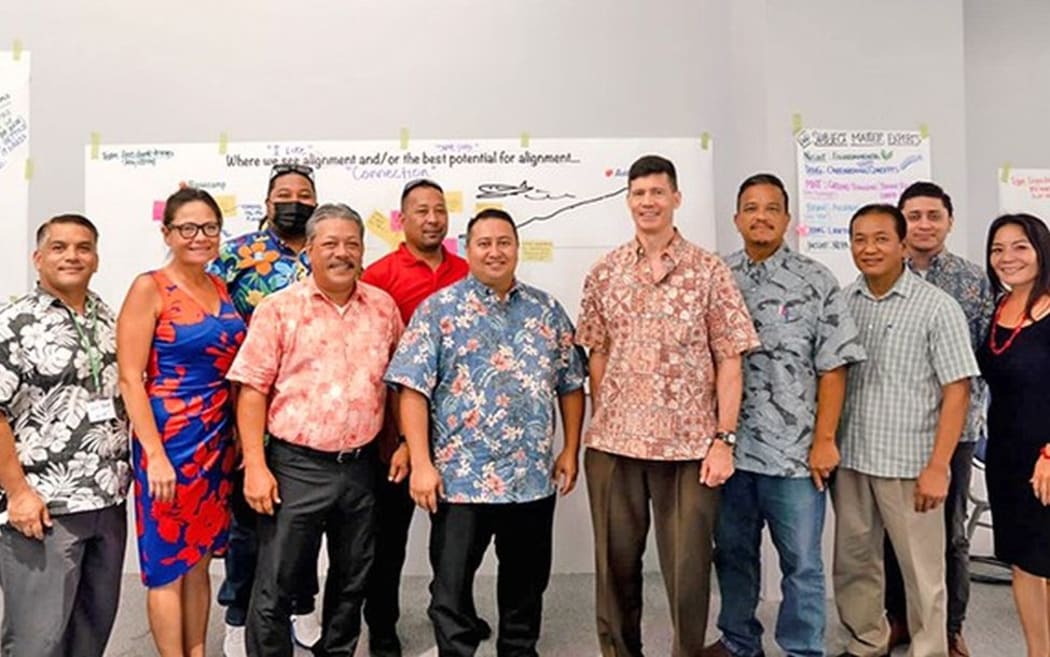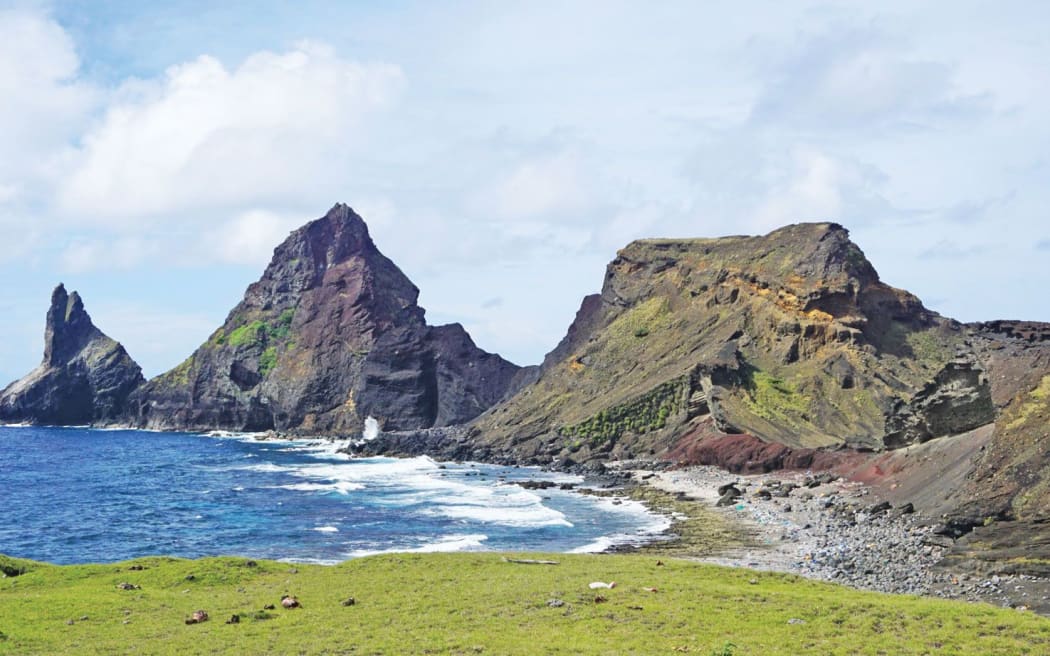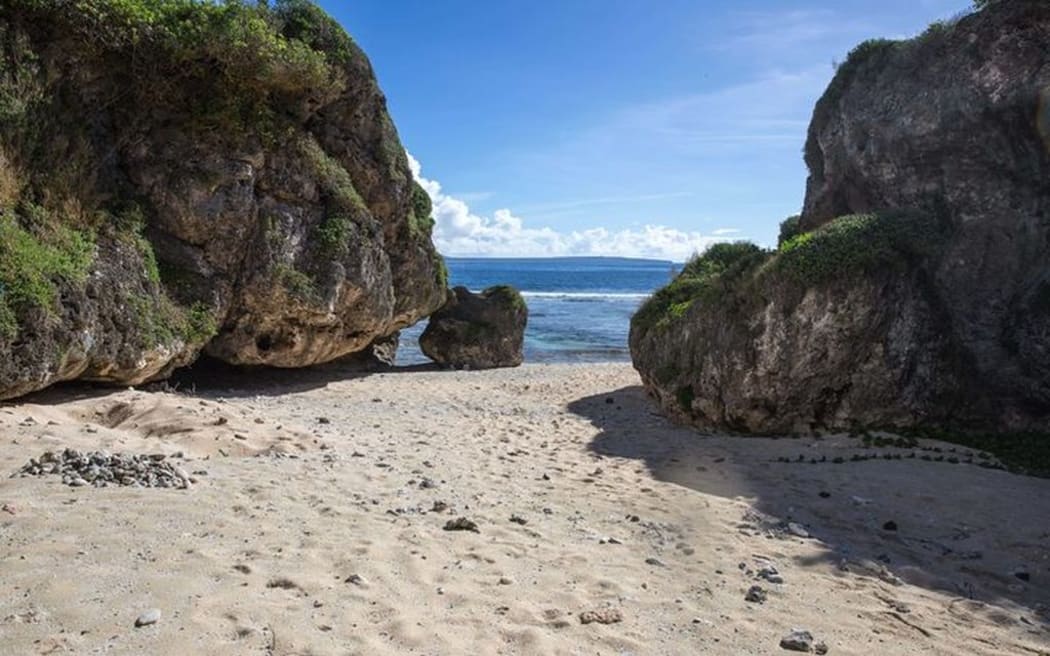After a series of meetings the United States Department of Defence (DoD) is scaling back its military activities in the Commonwealth of the Northern Marianas.
These changes are outlined in an amended proposal of the 2015 Commonwealth Joint Military Training Draft Environmental Impact Statement.
The US military will no longer conduct bombing training activities on the island of Pagan and has cancelled live-fire training and construction projects on the island of Tinian.

Gov. Ralph DLG Torres, sixth from left, is joined by Maj. Gen. Mark A. Hashimoto, fifth from right, Mobilization Assistant to the Commander, U.S. Indo-Pacific Command, and other ranking CNMI officials. Hashimoto is also the executive director for Marianas Forces Pacific. Photo: CNMI Government
Sparsely populated and remote, Pagan is part of the 14-island chain of the CNMI's Northern Islands.
Northern Islands Mayor Vicente Santos welcomes the move by DoD to take Pagan off the table for its military activities.
"I am pleased that Pagan is completely removed from the proposal. Over the last few years, Pagan has been the choice of vacation destination for CNMI residents and I look forward to the continued efforts toward developing the island for rest and recreation and for the eventual resettlement of our Pagan residents," Santos said.
"I want to thank DoD for respecting the wishes of the people and to Governor Ralph DLG Torres for ensuring my full participation to jointly represent the residents of the Northern Islands on this critical matter."
The US military will also be halting high-calibre live fire training on the island of Tinian. The amended proposal's goal is to make sure that future military activities are significantly less impactful and harmful to the environment and the way of life for the people of Tinian.

Pagan Island Photo: Saipan Tribune
Also scrapped are construction projects for landing ramps in Chulu Beach, a high hazard impact area for the use of artillery and aviation delivered munitions, an extensive range footprint, extensive fencing, and special u-se airspace.
Tinian Mayor Edwin Aldan said the amended proposal is a significant step in the right direction for the people of Tinian who will be most impacted by these training activities.
"The extensive reduction in range footprint will allow continued access and co-use of the mlilitary leased area, which will allow our cattle ranchers and our cattle industry to grow," he said.
"The exclusion of artillery and aviation delivered munitions and high hazard impact activities means no more bombs and howitzers type of weapons. Because these activities are removed, there is no longer a need to restrict airspace and allows for a greater public access to historical sites and beaches within the MLA, which is critical to our tourism industry and our economy.
On behalf of the Tinian Leadership and the people of Tinian, I want to thank Governor Torres and Major General Mark Hashimoto for their leadership on this matter. This is a big win not only for the people of the Tinian but for all of the CNMI," Aldan said.
The amended proposal follows a series of meetings between Torres, DoD, the Tinian leadership led by Aldan, Santos, and key stakeholders in the community.
It comes after a total of 27,000 comments were submitted as part of the National Environmental Policy Act process. The comments included those of the residents of Tinian and Pagan.
The comments clearly showed local opposition to the destruction of Chulu Beach, the construction of a high hazard impact area and the other projects which were going to negatively impact the local culture, environment, and economy.
Torres extends his appreciation to the U.S. Indo-Pacific Command, U.S. Marine Forces Pacific, and Joint Region Marianas for their partnership.
"I thank US Indo-Pacific Commander Aadmiral John Aquilino Mobilization Assistant to the Commander Major Genenral Mark Hashimoto, Rear Aadmiral Benjamin Nicholson, and their team for their partnership," said Torres.

A beach in Tinian, CNMI, used for subsistence fishing and recreation by local residents. Proposed US military live-fire training would prevent access to this beach much of the year. Saipan is visible just across the water. Photo: Dan Lin
"The amended proposal is drastically different in content and nature than the proposal submitted in 2015, achieving a closer balance to the type of development we see in the Commonwealth, and is more aligned with the intents of our founding fathers in their work toward crafting our Covenant.
Thank you again for all the work put into ensuring the voices of the CNMI are a part of this process and for taking the conversations of the Technical Working Group to heart in fostering a real partnership for us all," Torres said.
Last week, the CNMI-DoD Technical Working Group reconvened in a three-day series of meetings to discuss the revised training concept.
"I would like to thank all members of the CNMI [Technical Working Group] for their dedication and participation in these critical engagements and for their vigilance in the protection of our culture, environment, resources, and our way of life," said Torres.
"We all have a role in this development, and we all, DoD and CNMI alike, are benefited from a plan that supports our nation's security while maintaining [devotion] to the sustainability and protection of our islands. Being American also means we have responsibilities along with rights. Let's continue the good work that is being done and build on this partnership.
But also remember what got us here today-honesty about the issues, openness to discussion, and persistence to doing what is right for the people of Tinian, our Commonwealth and our nation," he said.
Representing U.S. Indo-Pacific Command, Major General Mark Hashimoto stated, "Our guiding principle during these interactions was to show deep respect for the land, people, and culture of the CNMI. To keep and strengthen trust, we must continue to do the right things, for the right reasons. The people of the CNMI spoke, and the Department of Defense listened."
Hashimoto further commended the skill and professionalism of CNMI agency representatives. "We could not have asked for a better group of partners as we seek to strike the right balance among our four imperatives-protecting natural and cultural resources; lessening and mitigating training impacts; improving economic opportunity; and advancing national security interests," he said.
Hashimoto closed on a note of optimism. "I believe our interaction should inspire others and serve as a model for how the Department of Defense engages with local communities. I believe these favorable conditions will carry us into future discussions where there is only one approach-to move forward, together."

